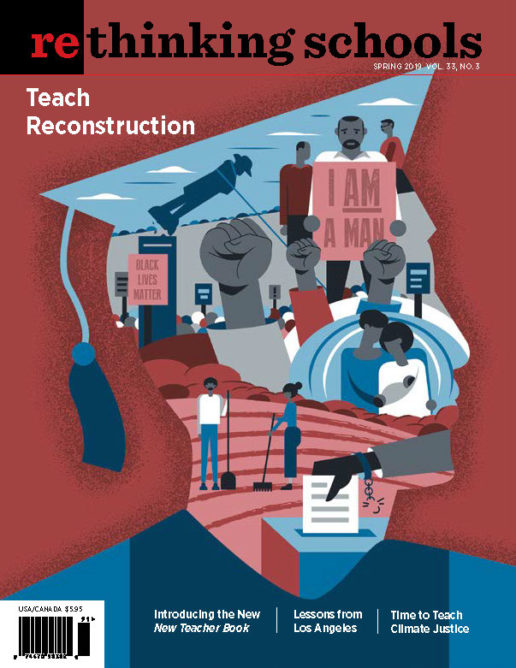Children Deserve Classrooms, Not Cages
A “Teach-In for Freedom” is organized by Teachers Against Child Detention.

Most of my students, like most Americans, do not want new construction on a border wall.
Each week in my high school English classroom, we read the news. I introduce an article on Monday and we debate some thread of it on Friday. Weeks into the recent government shutdown, my seniors took up the question of whether the president should declare a national emergency in order to build a wall on the southern border with Mexico. All but one student filtered to the “disagree” and “strongly disagree” corners; in short, they found a wall ineffective, wasteful, and ugly.
I teach at a public school in Fall River, Massachusetts, a deindustrialized mill town that does not typically share its politics with the rest of the blue state. In fact, back in 2016, the New York Times profiled Fall River as part of Trump Country, where then-candidate Trump won 62.2 percent of the Republican primary vote.
Still, Fall River is a city of immigrants — both documented and undocumented. My students and their families come from the Azores, Central America, and Cambodia, and they fill our hallways with the Portuguese, Spanish, and Khmer of home. So when the president declared an emergency to build his wall, they erupted.
Wall or no wall, violence already defines the border. Right now, thousands of Central American children fleeing crushing poverty, crime, and gang violence languish in the custody of U.S. Customs and Border Protection and Immigration and Customs Enforcement. A child detained by ICE will be held, on average, for 100 to 240 days, often far from family members and without proper legal representation.
The same mid-February weekend that Trump declared his manufactured emergency, I traveled to El Paso on behalf of the Massachusetts Teachers Association to take part in a “Teach-In for Freedom” organized by Teachers Against Child Detention. This event, among other demands, “called on the U.S. government to end the detention and criminalization of immigrant children and their families.”
We believe all children deserve to be in school. All children deserve to be free.
Last semester, I taught a student from El Salvador, who wrote that when she was 14 years old, she made the difficult decision to come to the United States.
“It was not so much that I wanted to do it, but because I needed to do it,” she wrote.
She had traveled with her cousin through Mexico to try to make it to the U.S. border in search of asylum, relying on strangers for help as they went. In the middle of Mexico, police detained them: “In small rooms, they fed us little food, and it was very ugly. . . . And so the days went by. We did not know if it was day or night . . . we did not have a place to bathe.” After 20 days, Mexican authorities put them on a plane back to El Salvador.
“That was very sad because we had suffered so much along the way,” she wrote. “Now, they would cut our wings and return us to our country.”
She spent just one day back at home with her mother before, impossibly, ripping herself away again. “It was hard for both of us,” she lamented, “because I am her little girl, and her little girl misses her just like she misses me.” This time, she and her cousin made it to the U.S. border. They turned themselves over to ICE, and she celebrated her 15th birthday in detention.
In the book Tell Me How It Ends, Valeria Luiselli describes her experience translating for children seeking asylum. She writes that “perhaps the only way to grant any justice . . . is by hearing and recording these stories over and over again so that they come back, always, to haunt and shame us. . . . Because we cannot allow ourselves to go on normalizing horror and violence.”
I carried my student’s story with me to El Paso, where I heard many similar stories from teachers and activists from across the country. Marisa Limón, deputy director of the local Hope Border Institute, ended the event with a call to action: “Now we have tarea, homework. . . . Now’s the time to share. Now’s the time to act.”
I return to my classroom with a renewed sense of urgency. I will continue to share these stories with my students, family, and legislators to honor all of the immigrant and refugee children who have made it to our classrooms, and the countless more whose wings have been cut.
I try to teach my students every year that another world — a better, more just world — is possible. There, without walls or cages, all children are free. All children are flying.

